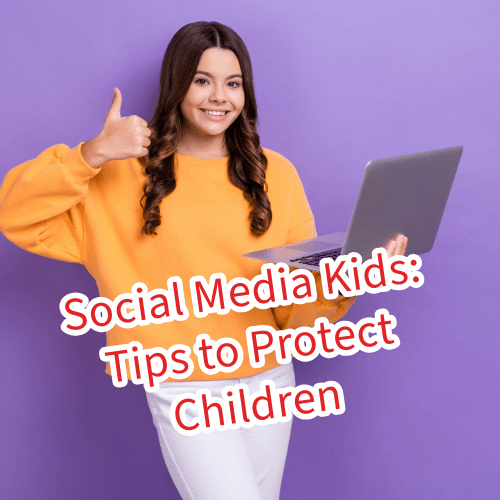
In today’s digital world social media has become an integral part of our lives. Platforms like Instagram, TikTok, and Snapchat are popular among young people, and children are spending more time online than ever before.
While social media can offer a variety of benefits such as creativity, self-expression, and connectivity with friends, it also presents several risks, particularly for children.
Exposure to cyberbullying, inappropriate content, online predators, and unhealthy comparisons can have a lasting impact on a child’s mental, emotional, and physical well-being.
As a parent or guardian, it’s crucial to stay vigilant and proactive in ensuring your child’s safety in the digital world.
Here are seven essential tips to protect children from the dangers of social media and allow them to enjoy the positive aspects of the online world.
Social Media Kids: Tips to Protect Children

- Set Clear Boundaries and Rules
The first step in protecting your child on social media is to establish clear boundaries and rules for its use.
Children need to understand that social media is a privilege, not a right, and that there are responsibilities for using these platforms.
Tips
Age-appropriate platforms
Ensure your child is using social media platforms that are appropriate for their age. Most social media platforms have a minimum age requirement of 13, as mandated by the Children’s Online Privacy Protection Act (COPPA).
Time limits
Set reasonable time limits on how long your child can spend on social media each day. This helps prevent excessive screen time, which can lead to sleep problems, anxiety, and other health issues.

Content rules
Talk to your child about the types of content that are appropriate to share and view. Encourage them to avoid engaging with harmful material, and emphasize the importance of thinking before posting.
- Teach Online Privacy
One of the most important things children need to understand is the concept of privacy online. Many kids don’t realize that once something is posted on the internet, it’s almost impossible to remove it completely.
Photos, videos, and personal information can be shared and stored by others, even after being deleted by the original poster.
Tips
Limit personal information
Encourage your child to avoid sharing personal details such as their full name, address, school, or phone number. Explain that even innocent-looking information can be pieced together by someone with bad intentions.

Private profiles
Make sure your child’s social media profiles are set to private, so only people they approve can see their posts. Regularly review their privacy settings to ensure they stay protected.
Passwords
Teach your child the importance of using strong, unique passwords for their accounts and never share them with anyone, not even friends. Consider using a password manager to keep track of passwords securely.
- Monitor Their Social Media Activity
Keeping an eye on their social media activity is crucial for ensuring their safety. Create an environment of open communication and trust where children understand that their safety is your priority.

Tips
Follow or friend your child
One way to know your child’s social media activity is to follow or be friends with them on the platforms they use. This allows you to see the content they are sharing and who they are interacting with.
Use parental control apps
Many apps allow parents to monitor their child’s social media usage, screen time, and the types of content they’re engaging with.
Some apps also offer the ability to block inappropriate websites or restrict access to certain apps during certain times of the day.
Conversations
Regularly talk to your child about what they’re doing on social media. Ask them about the apps they use, who they’re talking to, and whether they’ve encountered anything that made them uncomfortable.

- Talk About Cyberbullying
Cyberbullying is one of the biggest concerns when it comes to kids using social media. It can take many forms, from hurtful comments and spreading rumors to exclusion and harassment.
The effects of cyberbullying can be devastating, leading to anxiety, depression, and even self-harm or suicide in extreme cases.
Tips
Recognize the signs
Teach your child how to recognize cyberbullying, whether they’re the target or witness someone else being bullied online.
Signs might include mean or threatening messages, exclusion from group chats, or the sharing of embarrassing photos.

Encourage reporting
Let your child know that they can come to you if they experience or witness cyberbullying. Most social media platforms have reporting tools that allow users to flag inappropriate behavior, and it’s important that children feel empowered to use these tools.
Teach empathy
Encourage your child to be kind and empathetic online, just as they would be in person. Teach them that it’s never acceptable to say hurtful things to someone, even if it’s in a group setting or feels like everyone else is doing it.
- Be Wary of Online Predators
Unfortunately, online predators are a real danger, and social media provides a convenient way for them to connect with children.
Predators often pose as children or teens themselves to gain the trust of their victims.
They may send friend requests, comment on posts, or engage in direct messages to reach their target.

Tips
Online Strangers
Just as you teach your child not to talk to strangers in real life, it’s important to remind them that they should never accept friend requests or messages from people they don’t know online.
Teach critical thinking
Help your child understand that people aren’t always who they claim to be online. Encourage them to think critically about the interactions they have and be cautious about sharing personal information, even with someone they think they know.

Know the red flags
Make sure your child is aware of red flags that could indicate they’re interacting with a predator, such as being asked to keep a conversation secret, requests for inappropriate photos, or sudden shifts from friendly messages to uncomfortable ones.
- Promote Digital Well-Being
The comparison and pressure to fit in on social media can affect a child’s mental health. Please encourage your child to focus on positive aspects of their digital life and promote a healthy balance between online and offline activities.
Tips
Self-worth
Talk to your child about the dangers of comparing themselves to others online. Help them understand that social media often presents an unrealistic version of people’s lives and that likes or followers don’t determine their worth.

Encourage offline activities
Make sure your child is engaging in hobbies and activities outside of social media. Please encourage them to spend time with friends and family in person, play sports, or participate in creative activities that don’t involve a screen.
Teach mindfulness
Introduce the concept of digital mindfulness, encouraging your child to take breaks from social media and be more intentional about their online interactions.
Teach them to recognize when social media is making them feel anxious or stressed, and help them avoid stress.

- Stay Informed and Involved
The world of social media is changing with new platforms, trends, and risks emerging all the time. As a parent, it’s essential to stay informed about the latest developments and be active in your child’s digital life.
Tips
Educate yourself
Take the time to learn about the social media platforms your child is using. Understand the features, potential risks, and privacy settings so you can guide your child effectively.

Lead by example
Build good digital behavior on your social media usage. Show your child how to use these platforms responsibly and positively, and be open about the potential risks of social media.
Social media offers incredible opportunities for connection and creativity, but it also presents real risks for children.
Being proactive and maintaining open communication with your child can ensure their safety on social media.
These tips can help protect children on social media and the mysterious online world.
AI Tools for You
https://www.bestprofitsonline.com/myblog/newai
Tip
How To Improve Your Social Media Marketing
